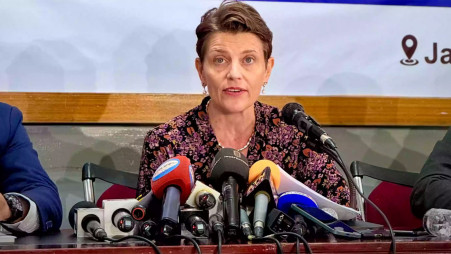02/21/2026

Inclusive politics key to avoiding unrest in Bangladesh: UNRC
Diplomatic Correspondent | Published: 2025-06-04 21:36:01

United Nations Resident Coordinator in Bangladesh Gwyn Lewis on Wednesday said the participation and inclusion of all political parties will help prevent a ‘very polarised position’ and potential ‘unrest’, though the circumstances should be viewed in the context of the country.
"But I think circumstances need to be looked at....the decision of the government needs to be looked at in the context of the country. It is very much a political decision and again a decision of the government," she told diplomatic correspondents at a programme titled ‘DCAB Talk’ when a journalist drew her attention regarding the recommendations made by the UN fact-finding mission against banning any political party.
The UN Resident Coordinator highly appreciated reform efforts undertaken by the interim government, noting that the process is very robust.
Diplomatic Correspondents Association, Bangladesh (DCAB) hosted the event at the Jatiya Press Club. DCAB President AKM Moinuddin and General Secretary Md Arifuzzaman Mamun also spoke at the event.
The Office of the United Nations High Commissioner for Human Rights (OHCHR) in its fact-finding report shared recommendations in some specific areas including accountability and justice, police and security; civic space, political system and economic governance.
The UN human rights office recommended Bangladesh to refrain from political party bans undermining democracy and disenfranchising part of the electorate.
In the fact-finding report, the UN observed that political party bans would undermine a return to a ‘genuine multiparty democracy’ and effectively disenfranchise a large part of the Bangladeshi electorate.
The UNRC, however, said she is not going to comment on the political positioning of Awami League or BNP, stressing that the UN is not involved in politics.
Extending UN's support for a credible and peaceful election, UNRC Lewis said for the UN inclusive election means every segment of the society should be able to vote and everyone should have access and ability to participate in the election.
She said inclusiveness for the UN is very specifically about every Bangladeshi having a voice.
Responding to a question on the truth and healing process, Lewis said, "Our advice on truth and healing would be very strong national consultations with the people of Bangladesh to hear their voices and thoughts and how they see the future."
She, however, said it is very difficult to say what path should be taken until the consultation with the people in the country is finalized. "There needs to be a lot more consultations."
The UN Human Rights Office will soon establish an office in Bangladesh to support the country that's going through reforms in various sectors including political, bureaucratic, police and judicial sectors.
"We understand from the government that an MoU is finalised. We are waiting to sign it soon," she said.
"That means we will be able to open an Office of the Human Commissioner for Human Rights soon to support a lot of processes that are underway," Lewis said.
The UN Fact-Finding Mission last year submitted a report on the human rights violations highlighting the events of July and August last year.
The report said about 1400 people were killed during the July-August uprising and in the aftermath.
The International Crimes Tribunal is trying the perpetrators of the human rights violations.
Since becoming a member of the United Nations in 1974, Bangladesh has consistently demonstrated strong support for peace and international cooperation.
Bangladesh is recognised as one of the largest contributors to UN peacekeeping operations, with thousands of courageous men and women serving in some of the world’s most challenging environments.
The UN Resident Coordinator addressed a number of issues including the Rohingya crisis with funding shortfalls.
Chief Adviser Professor Muhammad Yunus, in his meeting with the UNRC on Tuesday, highlighted the urgent need for sustained international solidarity and enhanced support to address these funding shortfalls and assist the Rohingya population in a better way.
The Rohingya crisis remains unresolved, and the prospect of their repatriation continues to be uncertain with the complex situation in Rakhine.
Editor & Publisher : Md. Motiur Rahman
Pritam-Zaman Tower, Level 03, Suite No: 401/A, 37/2 Bir Protik Gazi Dastagir Road, Purana Palton, Dhaka-1000
Cell : (+88) 01706 666 716, (+88) 01711 145 898, Phone: +88 02-41051180-81